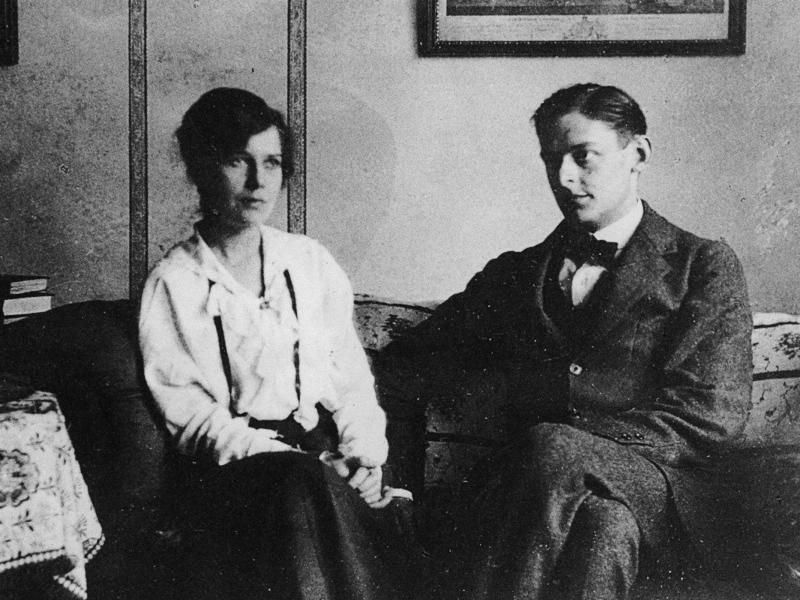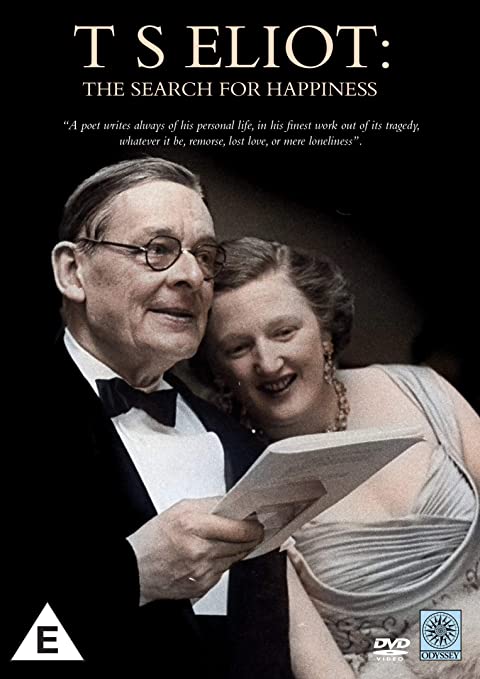DVD: T S Eliot - The Search for Happiness | reviews, news & interviews
DVD: T S Eliot - The Search for Happiness
DVD: T S Eliot - The Search for Happiness
Competent documentary revises the poet's reputation as a callous husband

“How it went with the women,” Martin Amis’s phrase for what most straight men are likely to contemplate in the evenings of their lives, would have made an ideal alternative subtitle for the 50-minute documentary T S Eliot: The Search for Happiness.
Until 1949, when Eliot met Valerie Fletcher, the secretary to whom he would be happily married from 1957 until his death in 1965, love went badly for the Nobel poet. He regarded his miserable 18-year marriage to Vivienne Haigh-Wood, who was probably bipolar, as “a hideous farce", while his fraught long-distance relationship with the American speech and drama teacher Emily Hale, for 17 years his confidante, ended sourly.
As is well-known, Haigh-Wood was committed by her brother Maurice to a private asylum in Finsbury Park in 1938; unvisited by Eliot, who paid the bills, she died there in 1947. Michael Hastings’s play Tom & Viv and Brian Gilbert’s 1994 film adaptation, along with The Painted Shadow, Carole Seymour-Jones’s 2001 biography of Haigh-Wood, did much to vilify Eliot for his abandonment of Vivienne, whom he saw only once after leaving England for a one-year teaching appointment at Harvard in 1932 and legally separated from in 1933.
 Letters first published in 2016 reveal that Eliot regarded Vivienne with compassion and was tormented by the breakdown of their relationship. It might be argued that the woman he treated most cruelly was Hale. The recipient of at least 1,131 of his letters, released for public viewing by Princeton University Library early last year, she was bled dry emotionally by his needy avowals of love and felt betrayed by his marriage to Fletcher. In 1960, Eliot was moved to say he had never loved Hale.
Letters first published in 2016 reveal that Eliot regarded Vivienne with compassion and was tormented by the breakdown of their relationship. It might be argued that the woman he treated most cruelly was Hale. The recipient of at least 1,131 of his letters, released for public viewing by Princeton University Library early last year, she was bled dry emotionally by his needy avowals of love and felt betrayed by his marriage to Fletcher. In 1960, Eliot was moved to say he had never loved Hale.
First broadcast on Sky Arts in December and recently released on DVD (without extras), the film revises the prevailing opinion of Eliot as a callous husband by allowing that he had a right to seek contentment after decades of sexual repression and guilt that he rationalized as Christian asceticism.
Like his fellow poet Philip Larkin, whose wretched love life Amis dishes on in Inside Story: A Novel, Eliot was terrified of female sexuality (though Seymour-Jones’s argument that he was gay was circumstantial). Unlike Larkin, whose alleged misogyny has been widely discredited, Eliot demonized women with lurid particularity. Analyzing the psychological provenance of female-phobic poems like “Hysteria” and “Sweeney Erect”, above and beyond Eliot’s growing revulsion for Vivienne, is beyond the film’s remit.
Like the Sky Arts documentaries about E M Forster, Rudyard Kipling, the British Great War poets, Virginia Woolf (who wrote viciously about Haigh-Wood), and D H Lawrence that have also been produced and directed by Odyssey Television’s Adrian Munsey and Vance Goodwin, T S Eliot: The Search for Happiness consists of talking-heads interviews with experts, mostly academics. Archival footage of Andrew Lloyd-Webber and Trevor Nunn, who riff amusingly about turning Eliot’s Old Possum’s Book of Practical Cats into a stage phenomenon, lightens the load.
It’s a solid TV format, but in Eliot's case the scholars’ general belief that his miserable first marriage fueled The Waste Land needed further elaboration, or challenging. The attempt to see the poet in the poetry is exciting, however, if critically suspect. The series as a whole may lack the creative ambition of Melvyn Bragg’s The South Bank Show, say, but it works as a useful set of primers or as a fillip to re-engage with the authors' and poets' works.
- D.H. Lawrence: Sex, Exile and Greatness airs on Sky Arts on 4 March.
- More DVD reviews on theartsdesk
rating
Buy
Share this article
The future of Arts Journalism
You can stop theartsdesk.com closing!
We urgently need financing to survive. Our fundraising drive has thus far raised £49,000 but we need to reach £100,000 or we will be forced to close. Please contribute here: https://gofund.me/c3f6033d
And if you can forward this information to anyone who might assist, we’d be grateful.

Subscribe to theartsdesk.com
Thank you for continuing to read our work on theartsdesk.com. For unlimited access to every article in its entirety, including our archive of more than 15,000 pieces, we're asking for £5 per month or £40 per year. We feel it's a very good deal, and hope you do too.
To take a subscription now simply click here.
And if you're looking for that extra gift for a friend or family member, why not treat them to a theartsdesk.com gift subscription?
more TV
 Down Cemetery Road, Apple TV review - wit, grit and a twisty plot, plus Emma Thompson on top form
Mick Herron's female private investigator gets a stellar adaptation
Down Cemetery Road, Apple TV review - wit, grit and a twisty plot, plus Emma Thompson on top form
Mick Herron's female private investigator gets a stellar adaptation
 theartsdesk Q&A: director Stefano Sollima on the relevance of true crime story 'The Monster of Florence'
The director of hit TV series 'Gomorrah' examines another dark dimension of Italian culture
theartsdesk Q&A: director Stefano Sollima on the relevance of true crime story 'The Monster of Florence'
The director of hit TV series 'Gomorrah' examines another dark dimension of Italian culture
 The Monster of Florence, Netflix review - dramatisation of notorious Italian serial killer mystery
Director Stefano Sollima's four-parter makes gruelling viewing
The Monster of Florence, Netflix review - dramatisation of notorious Italian serial killer mystery
Director Stefano Sollima's four-parter makes gruelling viewing
 The Diplomat, Season 3, Netflix review - Ambassador Kate Wyler becomes America's Second Lady
Soapy transatlantic political drama keeps the Special Relationship alive
The Diplomat, Season 3, Netflix review - Ambassador Kate Wyler becomes America's Second Lady
Soapy transatlantic political drama keeps the Special Relationship alive
 The Perfect Neighbor, Netflix review - Florida found-footage documentary is a harrowing watch
Sundance winner chronicles a death that should have been prevented
The Perfect Neighbor, Netflix review - Florida found-footage documentary is a harrowing watch
Sundance winner chronicles a death that should have been prevented
 Murder Before Evensong, Acorn TV review - death comes to the picturesque village of Champton
The Rev Richard Coles's sleuthing cleric hits the screen
Murder Before Evensong, Acorn TV review - death comes to the picturesque village of Champton
The Rev Richard Coles's sleuthing cleric hits the screen
 Black Rabbit, Netflix review - grime and punishment in New York City
Jude Law and Jason Bateman tread the thin line between love and hate
Black Rabbit, Netflix review - grime and punishment in New York City
Jude Law and Jason Bateman tread the thin line between love and hate
 The Hack, ITV review - plodding anatomy of twin UK scandals
Jack Thorne's skill can't disguise the bagginess of his double-headed material
The Hack, ITV review - plodding anatomy of twin UK scandals
Jack Thorne's skill can't disguise the bagginess of his double-headed material
 Slow Horses, Series 5, Apple TV+ review - terror, trauma and impeccable comic timing
Jackson Lamb's band of MI5 misfits continues to fascinate and amuse
Slow Horses, Series 5, Apple TV+ review - terror, trauma and impeccable comic timing
Jackson Lamb's band of MI5 misfits continues to fascinate and amuse
 Coldwater, ITV1 review - horror and black comedy in the Highlands
Superb cast lights up David Ireland's cunning thriller
Coldwater, ITV1 review - horror and black comedy in the Highlands
Superb cast lights up David Ireland's cunning thriller
 Blu-ray: The Sweeney - Series One
Influential and entertaining 1970s police drama, handsomely restored
Blu-ray: The Sweeney - Series One
Influential and entertaining 1970s police drama, handsomely restored
 I Fought the Law, ITVX review - how an 800-year-old law was challenged and changed
Sheridan Smith's raw performance dominates ITV's new docudrama about injustice
I Fought the Law, ITVX review - how an 800-year-old law was challenged and changed
Sheridan Smith's raw performance dominates ITV's new docudrama about injustice

Add comment